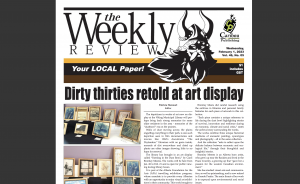Celebrating rural health care

This week is Alberta Rural Health Week; a great opportunity to honour the contributions of rural Alberta-based health professionals and community volunteers who help provide superb health care close to home.
Melody Henriksen, Area Manager for Acute Care Services Alberta Health Care sites in Hardisty, Daysland, Viking, and Tofield, says there are definite advantages to working in health care in a rural community. “You get to work to the full scope of everything you learned in your schooling. One day you may be in Emergency, the next, doing out-patient care.
“Working in a rural health care centre is a unique setting, where the camaraderie is invaluable, and is very rewarding.”
Killam Health Care Centre’s Site Manager Geraldine Clark agrees, “We have to be experts in so many ways: Emergency (Cardiac, Trauma, Overdoses,) Medicine, Continuing Care, Community Care, Dementia Care, Care of Pediatrics, the Adult and the Elderly.
“Nursing staff work in all these aspects to provide care to the people we serve.”
Henriksen says one of the most common themes she sees in patients is that they are always happy to return from larger centres to the hospitals in their home communities.
“The team in a rural hospital all have a role to play in a patient’s journey.
“We are all here for the same reason. In rural health care centres there is a lot of pride in service delivery, from housekeeping, to the lab, nurses, and physicians, because they know how it impacts their neighbouring communities.”
She says another unique aspect of rural health care are facility leadership teams with representatives from all departments who share information about patient care. “There’s a big comfort level in knowing who your colleagues are in each department.
Clark agrees. “We always celebrate the whole site instead of just nursing, or the doctors because it takes the whole team to make this work in rural and many times each employee wears multiple hats.”
“It goes beyond just team work,” Henriksen says, “all of the multi-disciplinary care providers work together. There’s no custom department to refer patients to.
“Team rounds can include a physiotherapist, doctor, nurse, and home care liaison, all working together for the patient.”
Clark adds, “And we have limited numbers of staff on shift who jump to help out wherever they are needed in the event of an emergency.”
She says health care workers tend to develop really close relationships with their patients.
Clark says, “Our patients are our families, our friends, neighbours and sometimes each other. So not only are we having to wear that professional hat, we are attached to our patients personally, too.”
Henriksen says she’s proud to be part of rural healthcare. “We need to keep rural health practices functioning at their full scope, and prioritize equitable access to health care.
“Some programs have been centralized, like surgery, but at our facilities we are able to offer special programs. Rural patients have access to consults, telehealth, mobile screening, and other tools to ensure the best care possible is accessible.”
Henriksen says that each of the sites she works at offer a large inventory of services, and ensuring patients know about them and how to access them is a priority for her. “HealthLink [Dial 811] is here for rural Albertans, to provide not only immediate urgent medical advice or answers, but to provide information on courses and services available in their area.
“They help you navigate the system.”
Henriksen says that other important members of the rural health care system are hospital foundations, auxiliaries, and community groups, who help purchase equipment, sometimes training, and even help with recruitment. “These groups make meaningful contributions to our facilities and level of care.”
She also thanks those families who make meaningful donations to health care facilities as memorials. “That means someone wanted to make sure that the care they received is recognized through donations.”
Sometime this week take a moment to thank anyone you know who works in a rural healthcare environment, where every team member in every department makes a difference in patient care.
Leslie Cholowsky
Staff Reporter



